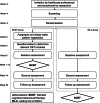Reducing severe fatigue in patients with diffuse glioma: a study protocol for an RCT on the effect of blended cognitive behavioural therapy
- PMID: 35841104
- PMCID: PMC9287927
- DOI: 10.1186/s13063-022-06485-5
Reducing severe fatigue in patients with diffuse glioma: a study protocol for an RCT on the effect of blended cognitive behavioural therapy
Abstract
Background: Fatigue is the most frequent and burdensome symptom of patients with diffuse glioma. It is closely linked to decreased health-related quality of life and symptoms such as depression and sleep disturbances. Currently, there is no evidence-based treatment that targets severe fatigue in patients with brain tumours. Cognitive behavioural therapy is aimed at fatigue-maintaining beliefs and behaviour. This therapy has been proven effective in reducing severe fatigue in cancer survivors and patients with multiple sclerosis. A blended therapy program combines sessions with a therapist with therapist-guided web-based therapy modules. The aim of this randomized controlled trial is to determine the efficacy of blended cognitive behavioural therapy in treating severe fatigue in patients with diffuse glioma.
Methods: We will include a maximum of 100 patients with diffuse glioma with clinically and radiologically stable disease and severe fatigue (i.e. Checklist Individual Strength, subscale fatigue severity ≥ 35). Patients will be randomized to blended cognitive behavioural therapy or a waiting list condition. The 12-week intervention GRIP on fatigue consists of five patient-therapist sessions and five to eight individualized web-based therapy modules supported by email contact. The primary outcome measure is fatigue severity. Secondary outcome measures include sleep quality, health-related quality of life, depression, anxiety, functional impairment and subjective and objective cognitive functioning. Primary and secondary outcome measures will be assessed at baseline and after 14 and 24 weeks. Magnetoencephalography and MRI will be used to evaluate potential biomarkers for intervention success. This trial has a Bayesian design: we will conduct multiple interim analyses to test for efficacy or futility of the trial. This is the first trial within the GRIP trial platform: a platform developing four to five different interventions for the most common symptoms in patients with diffuse glioma.
Discussion: The results of the GRIP on fatigue trial will provide information about the efficacy of this intervention on fatigue in patients with diffuse glioma. Multiple other outcomes and possible predictors of treatment success will also be explored.
Trial registration: Netherlands Trial Register NL8711 . Registered on 14 June 2020.
Keywords: Blended cognitive behavioural therapy; Cancer; Digital health; Fatigue; Glioma; Health-related quality of life; Online intervention; Psychosocial intervention; Web-based.
© 2022. The Author(s).
Conflict of interest statement
This trial is funded by the Stichting Anita Veldman Foundation. The authors declare that they have no other competing interests.
Similar articles
-
Testing non-inferiority of blended versus face-to-face cognitive behavioural therapy for severe fatigue in patients with multiple sclerosis and the effectiveness of blended booster sessions aimed at improving long-term outcome following both therapies: study protocol for two observer-blinded randomized clinical trials.Trials. 2020 Jan 20;21(1):98. doi: 10.1186/s13063-019-3825-2. Trials. 2020. PMID: 31959235 Free PMC article.
-
A web-based cognitive behaviour therapy for chronic fatigue in type 1 diabetes (Dia-Fit): study protocol for a randomised controlled trial.Trials. 2015 Jun 6;16:262. doi: 10.1186/s13063-015-0764-4. Trials. 2015. PMID: 26044447 Free PMC article. Clinical Trial.
-
A randomised controlled trial testing the efficacy of Fit after COVID, a cognitive behavioural therapy targeting severe post-infectious fatigue following COVID-19 (ReCOVer): study protocol.Trials. 2021 Dec 2;22(1):867. doi: 10.1186/s13063-021-05569-y. Trials. 2021. PMID: 34857010 Free PMC article.
-
Psychosocial interventions for preventing and treating depression in dialysis patients.Cochrane Database Syst Rev. 2019 Dec 2;12(12):CD004542. doi: 10.1002/14651858.CD004542.pub3. Cochrane Database Syst Rev. 2019. PMID: 31789430 Free PMC article.
-
Fatigue among patients with brain tumors.CNS Oncol. 2016;5(2):91-100. doi: 10.2217/cns-2015-0008. Epub 2016 Mar 17. CNS Oncol. 2016. PMID: 26987038 Free PMC article. Review.
Cited by
-
Baseline factors relating to depressive symptoms at one year postoperative in patients with diffuse glioma.Neurooncol Pract. 2024 Sep 20;12(1):122-130. doi: 10.1093/nop/npae085. eCollection 2025 Feb. Neurooncol Pract. 2024. PMID: 39917762 Free PMC article.
-
The Impact of Brain Tumors on Emotional and Behavioral Functioning.Cureus. 2024 Dec 8;16(12):e75315. doi: 10.7759/cureus.75315. eCollection 2024 Dec. Cureus. 2024. PMID: 39776739 Free PMC article. Review.
-
Brain Tumor at Diagnosis: From Cognition and Behavior to Quality of Life.Diagnostics (Basel). 2023 Feb 2;13(3):541. doi: 10.3390/diagnostics13030541. Diagnostics (Basel). 2023. PMID: 36766646 Free PMC article. Review.
-
Non-pharmacological fatigue interventions for patients with a primary brain tumour: a scoping review protocol.BMJ Open. 2023 Dec 14;13(12):e078183. doi: 10.1136/bmjopen-2023-078183. BMJ Open. 2023. PMID: 38101835 Free PMC article.
-
Roles and Impacts of Integrative Medical Interventions in Central Nervous System Tumor Treatment: Multi-Technology Convergence and the Paradigm Shift Toward Functional Reconstruction.CNS Neurosci Ther. 2025 Jul;31(7):e70516. doi: 10.1111/cns.70516. CNS Neurosci Ther. 2025. PMID: 40654157 Free PMC article. Review.
References
-
- National Working group on Neuro-Oncology (LWNO). Richtlijn gliomen. 2015. [cited 2019 December 22] https://richtlijnendatabase.nl/richtlijn/gliomen/gliomen_-_startpagina.html.
Publication types
MeSH terms
Grants and funding
LinkOut - more resources
Full Text Sources


